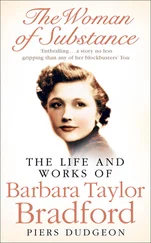David said, ‘A few days longer at least. There are hundreds of thousands of British and French troops to lift off, you know.’
‘I read today that the Luftwaffe is keeping up a steady bombardment of the beaches,’ Emma said. ‘I dread to think of the casualties.’
There are bound to be some, Emma,’ Blackie said. ‘But the RAF boys are up there in their fighter planes doing their damnedest to-’
‘Bryan, Robin, and Tony amongst them, Blackie,’ Emma interjected, and she looked away.
‘We all feel frustrated and helpless, sitting here in London. But all we can do is pray that our sons will be safe. And we must be cheerful,’ Blackie said. ‘Now come along, let’s have another drink. It will do us good.’ As she fixed their drinks Blackie’s eyes strayed to the clock on the mantelshelf. ‘Do you mind if we turn the radio on, Emma? Winston Churchill’s about to speak.’
‘No, of course not. I’d like to hear him myself.’ She rose and fiddled with the knob, tuning in to the BBC, and a moment later the familiar rhetorical voice rang out: ‘Good evening. This is the Prime Minister.’ The three old friends, who had shared so much in the past thirty years, sat back to listen, even more strongly joined together by fear for their sons and all the sons of England. When the Prime Minister had finished, Emma’s eyes stung and her voice quavered when she said, ‘What an inspiration that man is to us all. God help us if we didn’t have Churchill.’
The epic of Dunkirk gripped the imagination of England and her allies. Out of hell came back all the little steamers and rowing boats and pleasure steamers, bringing back the living and the wounded. The evacuation had taken eleven days, and 340,000 Allied troops had been rescued by the time the Germans captured the French sea town. Only 40,000, mostly French, were left behind. Emma and David were lucky. Amongst those to land at Ramsgate on June 1 and 2 were Ronnie and Mark, and on June 3 Kit stepped off the barge that had transported him to Deal across a choppy Channel jammed with vessels and wreckage. Kit told Emma later, when he came home on leave, ‘I just made it by the skin of my teeth, Mother. I must have a guardian angel watching over me.’ He embraced her tightly, and, clinging to him, she choked up, thinking of his father, who had died in France in 1916, apparently in vain.
On June 4 Winston Churchill rose in the House of Commons and made a speech on Dunkirk. At one moment he said, ‘We shall fight on the beaches, we shall fight on the landing-grounds, we shall fight in the fields and in the streets, we shall fight in the hills; we shall never surrender.’ Six days later the French Government and the Army High Command fled Paris as the Nazi army drew closer. Four days after that the French capital was captured by the Germans, who took it without firing one shot. France had fallen.
Britain stood alone.
That summer was the worst Emma could remember. In July the Battle of Britain began in earnest. Hitler had ordered an all-out offensive against the RAF, specifically Britain’s aircraft factories and the fighter bases that ringed London. Day after day, night after night, huge fleets of Dornier and Heinkel bombers swept across the Channel to pulverize Britain, while Messerschmitt fighter planes fought off the RAF Hurricanes and Spitfires that rose up into the sky in swift retaliation.
Awakened at night by the screaming air-raid sirens, Emma would get up and stand by the window in her darkened bedroom, looking out at the night sky starkly illuminated by the searchlights and echoing with the incessant drone of the bombers and fighter planes, her heart in her mouth as she thought of Robin, Tony, and Bryan and the other young pilots up there risking their lives. Some nights she was joined by Elizabeth, who had given up the small flat she had taken during her Royal Academy days, and was again living at home. ‘Are you awake, Mummy?’ she would invariably whisper, gliding into the room in her nightgown. ‘Yes, darling,’ Emma would answer, and the two of them would stand together, their arms around each other, watching the planes zooming past.
One night Elizabeth grasped her mother’s arm fiercely, and her voice was unusually harsh when she cried out, ‘Why, Mummy? Why? Why did this ghastly war have to start? What’s the purpose of it? They’re all going to be killed! Tony and Robin and Bryan, and all of our other boys!’
Emma had no answers for her daughter, or for herself. Elizabeth became distraught, sobbing uncontrollably. Emma put her arms around Elizabeth’s shoulders and led her to the bed. ‘They’re not going to be killed, darling,’ she comforted. ‘They’re going to be all right. I promise you. We must be brave. Get into my bed and sleep with me tonight. We’ll keep each other company.’
‘Yes, Mummy, I think I will,’ Elizabeth said, crawling under the covers. Emma held her close, as she had done when she was small and frightened of the dark. ‘Don’t cry and try not to worry, Elizabeth.’
‘If Tony gets killed I won’t be able to bear it,’ Elizabeth said through her tears. ‘I love him so much. And if Robin-’
‘Hush, darling. Try to sleep now. You must have your rest.’
‘Yes, I’ll try. Thank you, Mummy. Good night.’
‘Good night, dear.’
Emma lay in the darkness, waiting for Elizabeth’s tense body to relax and go limp in sleep. But it did not, and Emma knew that her daughter would spend yet another sleepless night worrying about her husband and her twin, as she would herself.
Emma had made a habit of walking to the store in Knights-bridge every day, and as the summer drifted on she did so to the accompanying sounds of anti-aircraft guns, whining sirens, falling rubble, and shattering glass. She would flinch when she saw a favourite landmark demolished, an ancient church in ruins, old haunts she and Paul had frequented flattened to the ground. Yet in spite of London’s devastation, its bleak mood, and the weary expressions on the faces she passed in the streets, Emma would nevertheless marvel at the stoicism and indomitability of her fellow countrymen and countrywomen. Often a cheery Cockney voice would break into a song, perhaps a fireman hosing a pile of smoking bricks or a workman clearing away the debris, and a cab driver would have a breezy comment to make, and they lifted her heart with courage. It was at times like these that she would remember Churchill’s words: ‘We shall never surrender’, and her strength was renewed, a spring returned to her step, her back straightened, and her head flew up proudly. And somehow her burdens seemed all that much lighter to bear.
The summer drew to a close. In September a large portion of the East End docks was destroyed in a massive air attack. The daily raids continued and the RAF pilots were tested to their limits, flying nonstop missions. The usual two- and three-day leaves were cancelled and Emma did not see Robin for weeks. The Royal Air Force was Britain’s last defence, and even though they were outnumbered three to one, the boys in blue in their Spitfires and Hurricanes out-performed the Luftwaffe. By October the Führer’s plan to destroy the RAF and break English morale in readiness for a full-scale invasion had proved a failure. In fact, Hitler had suffered his first major defeat. But the German bombers still continued night raids on the large cities, levelling many to the ground, and the grim years dragged on endlessly. Years of the Blitz; coupons, ration cards, and queues; shortages and deprivations; sorrow and grief as old friends and the sons and daughters of old friends were killed or named missing in action.
But in the midst of the devastation there was the miraculous renewal of life. In 1942, June, Kit’s wife, gave birth to a daughter. Emma was fond of June and delighted at the arrival of a second grandchild, and she went up to Leeds for the baptism of the baby, who was called Sarah. The same year, at the end of the summer term, Daisy left boarding school and came home to live with her mother and Elizabeth in Belgrave Square. Now the house did not seem so lonely and there were even moments of gaiety and laughter, especially when Robin came up from Biggin Hill, where he was stationed. He invariably brought one or two of his RAF friends from the 111th Squadron with him, explaining to Emma, ‘The chaps are going to bunk in with us, Ma. You don’t mind, do you? All the hotels are jam-packed.’ Emma did not mind. In fact, she willingly opened her doors and her heart to those dauntless young pilots.
Читать дальше
Конец ознакомительного отрывка
Купить книгу












